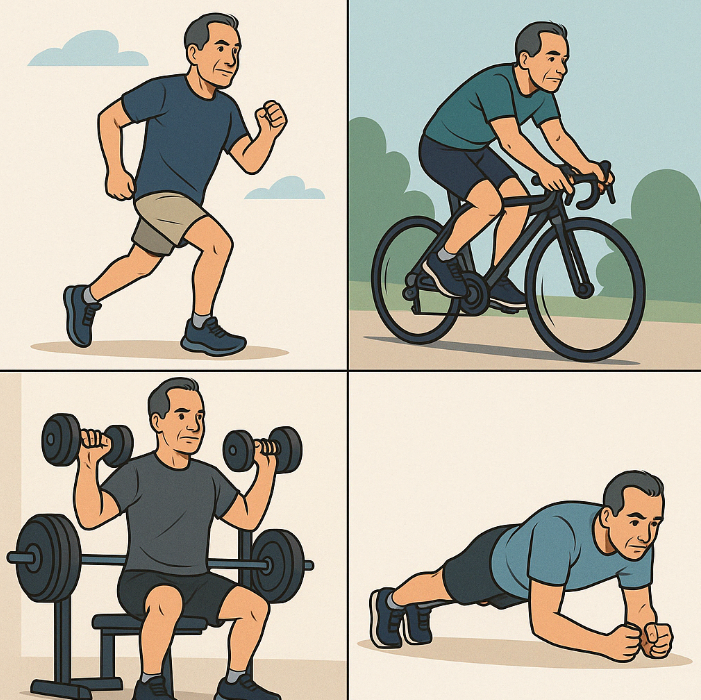
How Weekend Workouts Could Slash Your Risk of Heart Disease
Let’s say you’re busy. Like, really busy. You barely have time to breathe during the week—between work, errands, family, and everything in between. So you hit the gym hard on the weekends, cramming in long runs, bike rides, or HIIT classes.
Sound familiar? Congratulations—you might be a Weekend Warrior. And according to a major new meta-analysis of over 1.2 million people, that might actually be a great thing for your health.
Forget the guilt about not working out every day. This new research suggests that getting your heart pumping just one or two days a week might still protect you from heart disease, metabolic issues, and even mental decline. Here’s what the science says—and why this could be a game-changer for public health.
What Is a Weekend Warrior?
In fitness circles, a “Weekend Warrior” refers to someone who does most (or all) of their physical activity in just one or two sessions per week, usually on the weekend. They go hard, then go back to a more sedentary life during the workweek.
Historically, this pattern was thought to be less beneficial than spreading out exercise throughout the week. But as it turns out, intensity and total minutes may matter more than frequency—at least when it comes to big-picture health outcomes.
A Massive Meta-Analysis Says: It Works
This new study examined 27 observational studies covering over 1.2 million adults worldwide. Researchers wanted to know whether people who exercised intensely only on weekends still received the health benefits of more regular exercisers.
What they found was stunning:
- 25% lower risk of death from heart disease
- 30% lower odds of developing metabolic syndrome (which includes diabetes and high blood pressure)
- 28% lower risk of dementia
- Nearly 50% reduced odds of Parkinson’s disease
Even when people didn’t hit the gym daily, those concentrated weekend workouts still made a huge impact.
Why Does This Matter?
Most public health guidelines (like those from the WHO or CDC) recommend 150–300 minutes of moderate activity or 75–150 minutes of vigorous activity per week. But let’s be honest—life often gets in the way.
Many people just can’t find the time to work out five days a week. Jobs are demanding. Childcare is exhausting. Chronic fatigue, lack of access to fitness spaces, and simply being overwhelmed make it hard to keep a consistent schedule.
The idea that you can cram your activity into the weekend and still get life-saving benefits is not just liberating—it could reshape how we design fitness programs, public health campaigns, and community wellness strategies.
Your Brain and Body on Weekend Exercise
Let’s break down the key wins:
- Cardiovascular Health: Even two sessions of high-intensity physical activity can improve heart function, lower blood pressure, and reduce bad cholesterol.
- Metabolic Boost: Concentrated workouts improve insulin sensitivity, which helps prevent diabetes.
- Brain Health: Exercise increases blood flow and supports brain plasticity, reducing the risk of dementia and other neurodegenerative conditions.
- Mental Well-being: Weekend Warriors showed lower rates of depression and anxiety—likely thanks to those endorphin surges after hard workouts.
These benefits held true even after adjusting for factors like age, sex, and education. And they were especially strong among women.
Does This Mean Daily Exercise Is Out?
Not quite. Regular physical activity still offers consistent energy boosts, better sleep, and improved mood. But the takeaway here is flexibility.
In other words, if you can’t make it to yoga class on Wednesday or skip your Thursday run—don’t sweat it. What matters most is getting the time and intensity in where and when you can.
For many working adults, especially those in lower-income or high-demand jobs, this could reduce guilt and lower the barrier to entry for building healthy habits.
Rethinking Health Advice: Every Bit Counts
This research is a wake-up call for how we communicate about health. Too often, fitness advice feels all-or-nothing: If you’re not working out five times a week, you’re failing.
But the truth is messier—and more hopeful. A single 90-minute weekend hike, a couple of pick-up soccer games, or two intense gym sessions might be just what your body and mind need.
And public health professionals should take note: this opens the door for more accessible, inclusive exercise messaging. People with time constraints, disabilities, or caregiving duties still deserve strategies that work with their lives—not against them.
What Comes Next?
There are still questions to explore. How long do these benefits last? Are there risks with cramming all your activity into two days? What’s the best type of workout for a Weekend Warrior?
But the trend is clear: short bursts of movement can lead to long-term rewards.
Join the Conversation
- Are you a Weekend Warrior—or do you spread your workouts throughout the week?
- How could public health programs support intermittent exercisers better?
- What would make fitness more accessible in your community?
Don’t Wait – Stay Informed, Drive Change!
Public health needs your voice today. Join thousands of leaders making a difference by subscribing to This Week in Public Health. Get powerful updates and tools to create impact.
🔥 Every second counts! Share this blog now to expand our reach and strengthen our movement.



